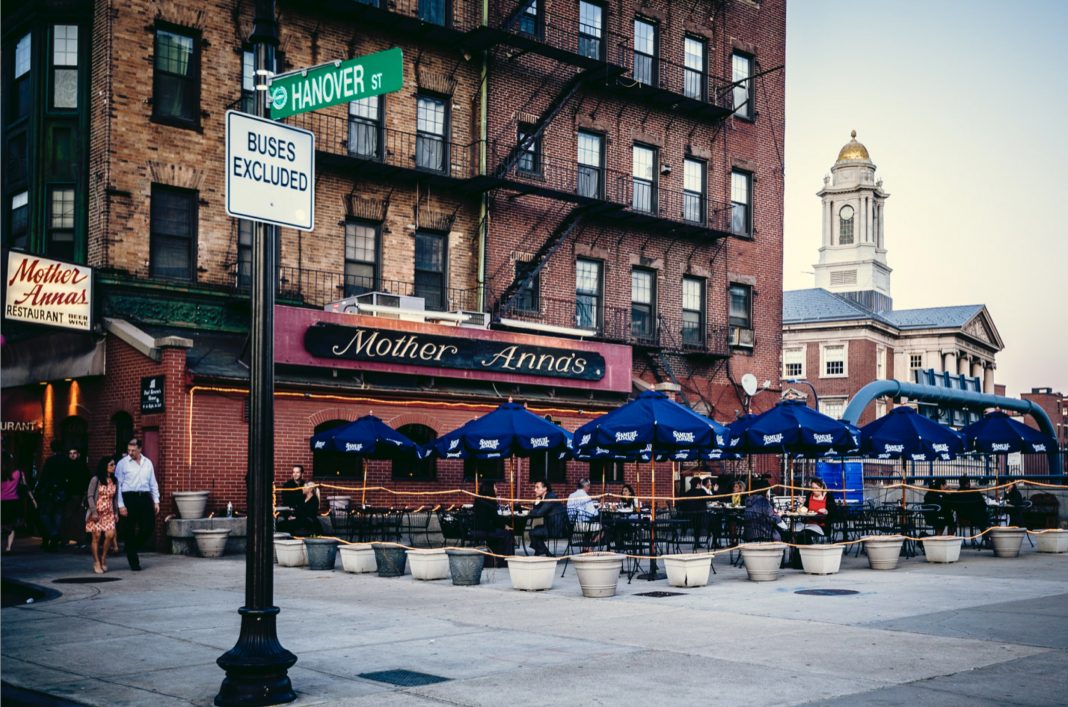City officials met with restaurant and bar owners to discuss the idea of a liquor license purchase/leasing program that would offer immediate financial relief to struggling businesses during a virtual hearing on Wednesday afternoon. The proposal, filed by Councilor Lydia Edwards (District 1), would allow the City of Boston to buy (and leaseback) liquor licenses from business owners which would provide them with the financial assistance needed to recover from their economic losses.

Boston’s vibrant restaurant industry has suffered a massive economic blow as the coronavirus pandemic continues to shutter local establishments and drive down tourism that normally provides a large portion of businesses’ revenue, especially in neighborhoods such as the North End.
“No one wants to eat Italian food every night of the week,” stated second-generation restaurateur Phil Frattoroli (Ducali, Cunard Tavern), pointing to the approximately 10,000 North End residents whose choices of variety from their neighborhood restaurants are limited to essentially only Italian cuisine.
Once the North End’s call-to-fame as the place in Boston to get authentic Italian food, restaurant owners are now struggling to compete in an oversaturated market that’s been forced to rely on the support of their local patrons.
“A lot of it is consumer confidence,” said Kathleen Joyce, Chairwoman of the Licensing Board. She expressed her concern that, even after reopening, restaurants would still be faced with customers who were uncomfortable with the idea of dining out amidst the ongoing pandemic.
Gustavo Quiroga, Director of Neighborhood Strategy and Development at Graffito SP, also noted the loss of revenue experienced by the lack of local sports and graduation celebrations that would normally draw customers to restaurants and bars.
Despite the City’s attempts to aid in recovery through various grants and other programs, it’s still not enough to keep Boston’s small restaurants and local mom-and-pop’s establishments afloat.
“I don’t believe all restaurants are necessarily created equal and all of them will not be able to bounce back in the same way,” said Councilor Edwards. Her solution is to allow the City to purchase transferable liquor licenses from owners at a fair price, transferring the ownership to Boston which would then return the license back to the operator. She apologized for the term “buyback” in her original language, since the City never sold the licenses in the first place, and amended her idea of leasing the licenses. Instead, owners would be expected to continue paying the typical licensing fees to the City.
However, Chairwoman Joyce expressed her hesitations regarding the proposal. Since the open market currently dictates the value of transferable licenses, determining the price the City should pay would be a difficult task. She communicated liability concerns as well with the City taking on the role as license owner.
“I don’t know how we make it equal,” she confessed, pointing to the possibility that the City purchasing unrestricted licenses and converting them to restricted ones could negatively impact the current value of liquor licenses for other owners.
Boston’s existing market for liquor licenses is an outdated concept where, prior to the COVID-19 pandemic, purchasing one was a $400K and upwards investment. The existing system has continually prohibited independent restaurateurs from opening in certain neighborhoods and has caused an additional financial strain on those who have a large amount of debt from purchasing their licenses from the open market.
“There are people sitting right now, thinking about how to take advantage of this economic opportunity in three months,” stated Councilor Kenzie Bok (District 8).
As the pandemic continues to wreak havoc on small businesses across the City, the fear is that wealthier restaurant owners will consolidate the liquor licenses that will inevitably flood the market at much lower prices than the businesses paid and effectively drive out small restaurant and bar owners.
Officials at the meeting further discussed how to establish an equitable and fair way to not devalue the existing licenses that many have worked very hard to maintain. At the same time, they cite an opportunity to gain control over liquor licenses and reform the current system while also offering much needed financial support to struggling businesses.
The full hearing can be viewed here.




“No one wants to eat Italian food every night of the week,”
Some people might not think that I honestly would have Italian every night over starving any day if I could. There’s always other shops around Boston you could have delivered. Pauli’s has more than Italian food. There’s also the China House and Billy Tse but who knows some people might be afraid now.
Restaurants have historically been high turnover and what we have experienced is a flash recession. The demand won’t come back because many people won’t have disposable income for a while. This coupled with lower density customer seating is going sap the industry of profit. We have a restaurant industry that was geared up for the economic expansion. The survivors will have to make due during the lean times. There will be a shake out. Politicians seem bent on trying to plug the whole in the Tianic.